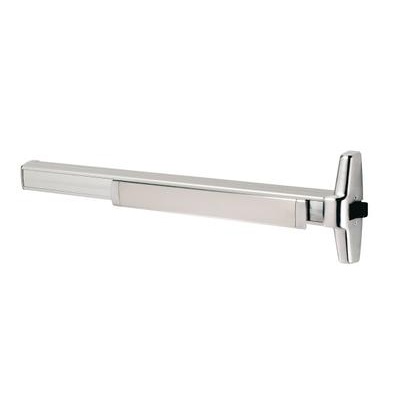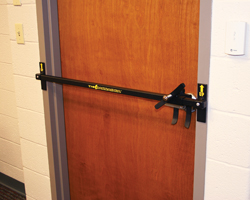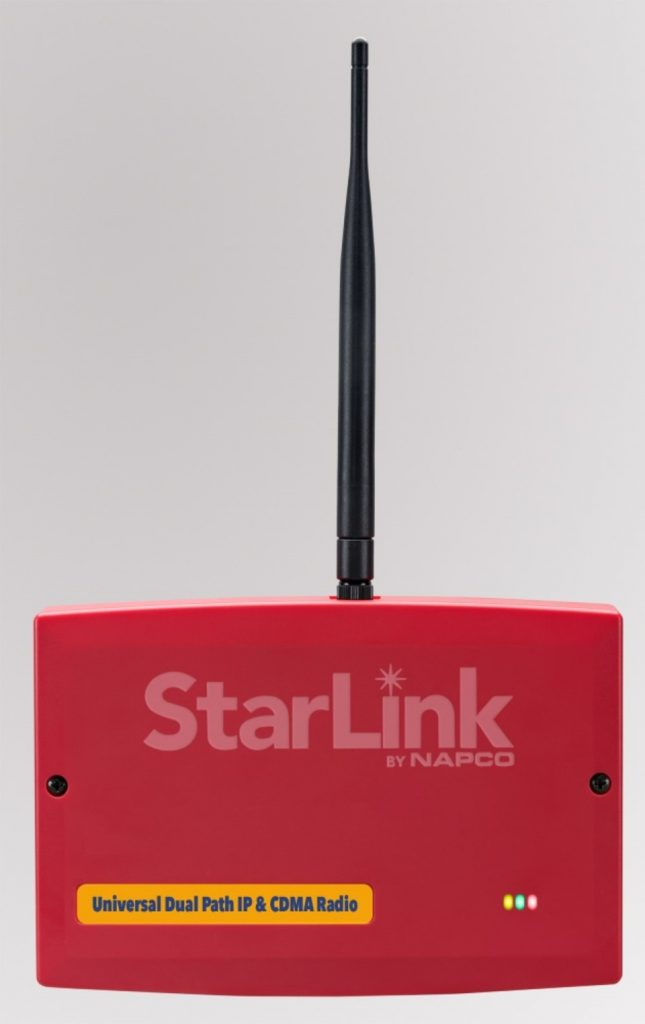Last week, we posted some tips for Avoiding Illegal Home Security Measures. We addressed both burglar alarm and camera surveillance issues that can put homeowners in legal trouble. In addition to legal issues, many of these mistakes also lead to less effective security. This week, we will share some tips on how to recognize and avoid or fix illegal commercial security issues.
We’ll start by sharing some of the regulations that home and commercial security have in common. Some of last week’s material will still apply here. From there, we’ll look at door security requirements from a few different angles. Entering and exiting commercial locations — especially with fires and large crowds in mind — receives a lot of attention from lawmakers. Therefore, this subject deserves a close look. Additionally, we’ll look at fire alarm monitoring and fire extinguisher inspection requirements. Inspectors often cite these areas for illegal commercial security violations, which makes them important as well. Let’s begin by looking at areas where home and commercial security requirements overlap.
Carry-Overs from Last Week’s Post
Just as with residential security, commercial security companies must obtain an electrical license. Additionally, commercial security providers must obtain an “S” license and go through the proper permitting and inspection procedures. Towns complete inspections on commercial security work on a much more consistent basis than home security. Therefore, illegal commercial security work is more likely to get caught than a poor home security installation. This means that companies may find themselves less likely to try any “shortcuts” or poor installation techniques. However, we have certainly seen our fair share of poor security work completed in commercial applications.
On the surveillance side of things, the same laws that govern residential surveillance apply to businesses. However, the circumstances surrounding camera installation changes somewhat. In businesses, you will find fewer places with an expectation of privacy. In homes, bedrooms, changing rooms, and bathrooms should never have cameras inside them. Businesses still have bathrooms, of course, but for the most part business owners can install cameras where they see fit.
As we pointed out last week, installing dummy cameras in a commercial setting will quite likely lead to trouble. Customers and employees alike see cameras and expect the property monitoring that surveillance provides. Therefore, installing dummy cameras in a business is a definite no-no. Finally, we recommend against installing cameras that capture audio in both home and commercial settings. We went into great detail about this last week, and the same concerns arise in any setting. Now, let’s discuss how installing the wrong lock hardware could create illegal commercial security.
Installing Door Hardware That Violates Legal Codes
Our post on Choosing the Right Commercial Lock Equipment pointed out that choosing locks for your business involves more than just picking effective and attractive hardware. On the contrary, installing the proper commercial locks requires following many sets of legal guidelines. Failing to do so could result in failing safety inspections. In extreme cases, installing the wrong locks can lead to legal action if it causes an issue during an emergency. Let’s look at some of the ways that locking hardware can create an illegal commercial security situation.

Exit devices, such as this Von Duprin model, provide quick, single-motion egress from a business.
Failing to Meet Fire Safety Requirements
Across the board, failing to meet fire safety requirements remains one of the most common ways for business owners to find themselves failing inspections and/or in legal trouble. Later on we’ll look at this concept from a couple different angles. Focusing on lock work, however, most of these regulations hinge on providing quick exit when needed most. Exterior doors that serve as fire exits in most businesses should have exit devices that provide single-motion egress. Many people know these devices (pictured) as “crash bars.” Employees or customers escaping a fire can use the bars to “crash” through the exit in one motion.
Additionally, specific types of businesses may require different fire safety and security equipment. The International Building Code (or “IBC) divides commercial buildings into several different categories. Churches and schools, retail spaces, and hotels, for example, have very specific and unique fire equipment requirements. We recommend contacting your local building department if you have questions about your business classification. Your local fire inspector can also help you ensure that you have the proper fire equipment. Taking care of potential issues before they arise can help avoid the potentially huge consequences of having a fire in your business without the proper security measures in place to minimize damage and allow for quick escape.
Falling Short of ADA Regulations
Ratified in 1990, the Americans with Disabilities Act (or “ADA”) created a country-wide set of regulations designed to provide access to businesses for handicapped individuals. These include regulations on many commercial applications, with business entrances and locks being the most relevant to this post. Despite the age of this act, we still see several violations in the field today. Installing doorknobs instead of ADA-compliant levers, for example, violates this law. Business owners should also make sure their door closes slowly enough to remain ADA-compliant. Doors that close quickly on individuals in wheelchairs could lead to a failed safety inspection.

Classroom barricade devices, such as the Barracuda products by Bilco, often violate local fire codes.
Working with a professional locksmith (such as us) will help you remain ADA-compliant. Most reputable commercial hardware companies already provide hardware withthese guidelines in mind. Trouble occasionally arises when business owners take installing lock equipment into their own hands. Having a professional locksmith company install your door hardware can help tremendously. These companies know how to find the right hardware to stay ADA-compliant based on your specific situation. Taking advantage of this service can almost guarantee that your lock hardware never creates an illegal commercial security scenario.
Utilizing Barricade and Lockdown Devices
Unfortunately, classroom violence has led many schools to look into finding ways to temporarily block access to classrooms. Some schools attempt to create this security through the use of classroom “barricade” devices. Unfortunately, these devices generally fail to meet local codes based on fire code violations. We created a post on Why Security Professionals Oppose Classroom Door Barricades addressing this topic. In that post, we addressed specific issues with these devices and some of the court cases around them.
Unfortunately, barricade devices make it impossible to leave a room without removing the device. Just as with some of the door hardware mentioned earlier, this violates fire code. Additionally, door barricades can keep authorities out of the room during an emergency. This possibility also creates an unsafe situation. Of course, we realize the importance and delicacy that classroom security involves. We recommend speaking to local inspectors and building departments about concerns with this issue. Different cities and towns deal with barricade devices and their legal ramifications differently. Getting the right advice can help ensure that your classroom security measures do not turn into illegal commercial security measures.
Inefficient or Illegal Fire Alarm Monitoring
Fire codes remain one of the trickiest codes to follow. Of course, this factor makes fire security measures one of the easiest ways to fall out of line with local regulations. In 2017, Massachusetts ratified the 2013 version of the National Fire Protection Association (or “NFPA”) 72 code book. You may (or may not) remember our post on Understanding Smoke Alarm Laws and Fire Code. In that post we introduced NFPA 72 as the main source for fire alarm system regulations. The 2013 version of NFPA 72 has some strict guidelines for fire alarm communication. Let’s look at basic regulations for both new and existing fire alarm systems.

Cellular Fire Dialers, such as the Starlink model by Napco, meets current codes for fire alarm monitoring.
Communication Regulations for New Fire Alarms
In the past, building owners could use two physical phone lines to monitor their fire alarm panel. Current code states that new required commercial fire alarms must communicate through a non-phone line method. Cellular dialers that use cellular networks to deliver central station monitoring fit this bill. Additionally, radios that communicate directly to local fire departments will fulfill this requirement. Some business owners still connect a phone line to their fire alarm. As long as a radio or cell dialer still remains to help with communication, this setup will still meet code. However, most new businesses that we work with skip connecting the alarm to a phone line. After all, current code does not require a phone line connection and the other means provide more dependable monitoring.
Maintaining Legal Communication for Existing Fire Alarms
Existing fire alarm systems that communicate through two phone lines still meet code, as long as the phone lines meet certain standards. However, the two phone lines must communicate through two completely different paths. This means that two phones provided by the same company do not fit the code. Furthermore, hooking up a Voice Over Internet Protocol (or “VoIP”) phone to your fire alarm does not meet the standard either. Therefore, major companies such as Comcast and Charter offer phones that cannot legally help monitor commercial fire alarm systems. We see more than our fair share of unacceptable fire monitoring practices in the field. These practices create an illegal commercial security situation, and could lead legal issues if a fire emergency does occur.
Fire Extinguisher Negligence
Like fire alarm systems, fire extinguishers must meet strict installation and maintenance guidelines. The NFPA also writes the code books governing these factors. In the case of extinguisher regulations, building owners and fire extinguisher professionals follow “NFPA 10.” This code book creates guidelines for both fire extinguisher installation and maintenance. In general, businesses must initially show compliance with local codes in order to gain their Certificate of Occupancy. However, as time passes, these businesses often fall behind on extinguisher maintenance.
Commercial fire extinguishers require an annual inspection. Licensed extinguisher professionals, such as ourselves, can perform this checkup onsite. Occasionally, smaller businesses will bring their extinguishers to us for inspection. We clean the extinguishers and make sure that their pressure gauge indicates the proper pressure for successful discharge. As long as the extinguisher passes inspection, we then “tag” it. This tag shows the month and year that we last serviced the extinguisher. NFPA 10 contains several reasons that extinguishers may fail this inspection. Extensive damage to extinguishers, for example, will cause them to fail. Using the wrong size or type of extinguisher for a given application will also lead to a failed inspection during on-site inspections.
Additionally, we perform more in-depth maintenance on most extinguishers every 6 years. During this maintenance, we must empty and recharge the extinguishers. Finally, we complete performance testing on most extinguisher types after 12 years. Failing to complete these services on time can lead to a couple different types of legal issues. For one, failing fire inspections can lead to fines. Additionally, lax extinguisher inspection practices can lead to insurance issues. If a business has a fire that could have been prevented or minimized by working fire extinguishers, insurance companies will want proof that the extinguishers on site had been properly maintained and inspected. Business owners who cannot provide this proof due to negligent extinguisher practices could well miss out on their insurance claim.
Avoiding Illegal Commercial Security Measures Altogether
We hope that this post will help you recognize and avoid illegal commercial security measures. With so many national and regional guidelines, it always helps to have professional help designing and installing commercial security. If you have any questions about the information in this post, we encourage you to contact us. We offer free commercial site surveys to help business owners address and avoid installing improper security. While on site, we can address any areas of concern you may have. Additionally, we can make recommendations of our own. We can help you create an efficient, effective, and completely legal plan to keep your business as safe and secure as possible.
Feature Photo Credit: Nick Youngtown from The Blue Diamond Gallery, used under the CC BY-SA 3.0 License.
